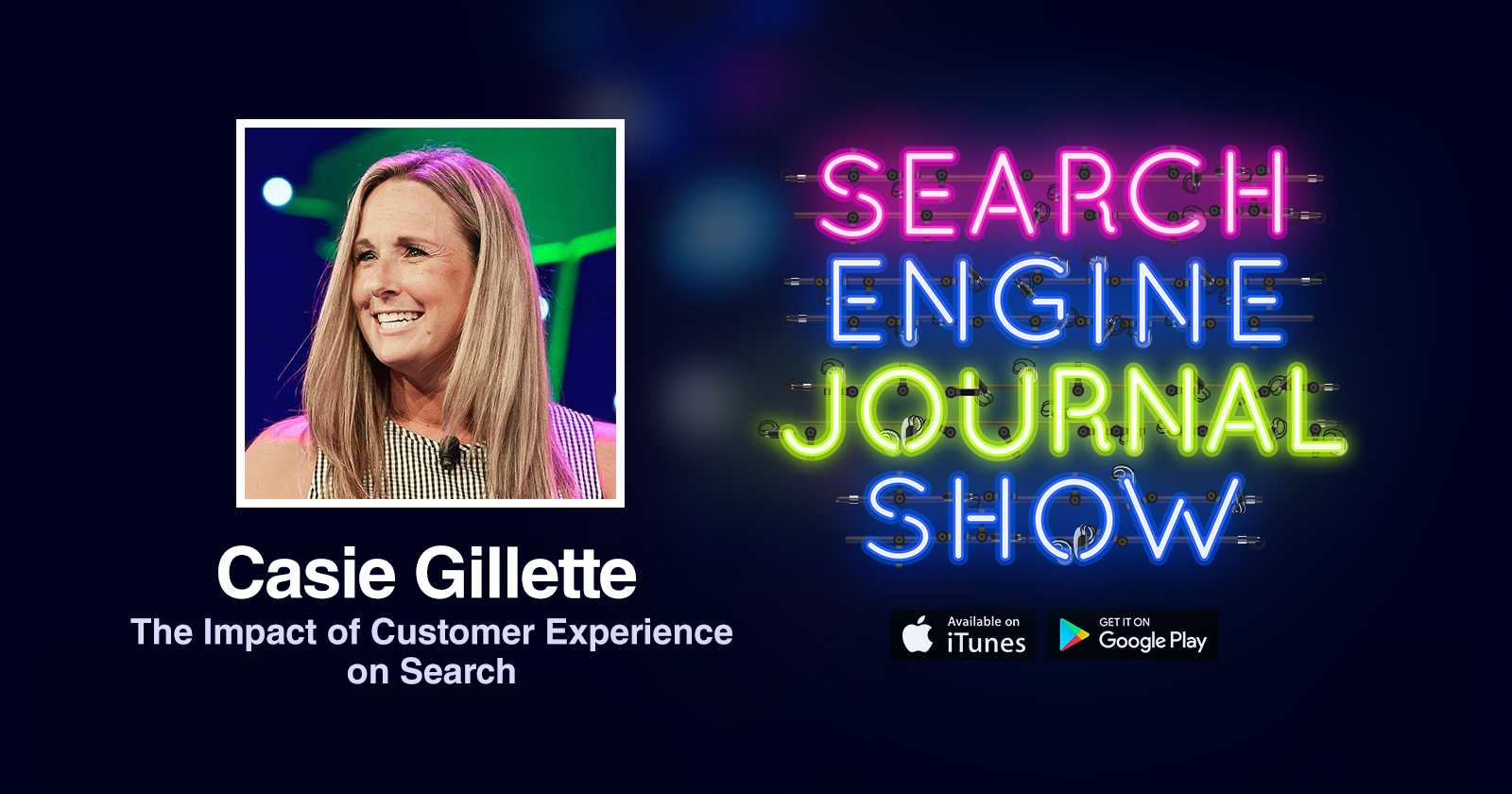Podcast: Download
Subscribe: Apple Podcast Google Podcasts Spotify
For episode 188 of The Search Engine Journal Show, I had the opportunity to interview Casie Gillette, Senior Director of Digital Marketing at KoMarketing.
Gillette talks about customer experience and the impact that it’s having on search and digital marketing as a whole.
![The Impact of Customer Experience on Search with Casie Gillette [PODCAST]](https://www.searchenginejournal.com/wp-content/uploads/2020/03/the-impact-of-customer-experience-on-search-with-casie-gillette-podcast-5e7b435769c67.png)
How do you see that kind of transition where customers experience is really all that matters?
Casie Gillette (CG): As search marketers… we talk about like, “Oh, we’re building for search engines.” The reality is that those search engines are getting so much smarter and they’re looking at what people want.
And so that’s where I think there’s this overlap now where the search engines know what customers want sometimes before we do. And so we have to adapt to that.
I think it’s just as big opportunity for us, and we’re seeing it happening.
We’ve gotten away from, for the most part, people are just optimizing straight up for search and the spiders themselves and the search engines themselves, but I still think we have a long way to go.
How do you deal with knowing that tomorrow is truly a customer experience algorithm, but today is still pulled back by some of these checklist elements?
CG: I love that question because you’re so right. There’s absolutely this balance.
The other key point is that sometimes when people are thinking about the customer experience as “Oh, I have to engage with my customers or get them to engage with me.”
We’re more thinking about, “Oh, I have to give them something or I have to be on social,” and we’re not necessarily thinking about our own sites.
So what I mean by that is, you get people coming to your site and yes, you’re optimizing for, you’re trying to get them through search, but you can do that by answering the questions that are being asked on search results.
Google gives us those questions. We see those answer boxes, we see those people also ask boxes. That’s what your audience is looking for.
If you can create the content that addresses those questions, now you’re optimizing for the search results to get people to your site and you’re giving your customers the experience they want.
I know for the past few years, people have talked a lot about some of these tools that give you the FAQs.
You have your Answer the Public, FAQ Fox. SEMrush is doing it now. A lot of the platforms have this where they’re giving you these questions.
To me, that has always been like search gold because those are the things your customers want and so you can do that and you’re helping yourself with optimizing your site.
Brent Csutoras (BC): I always used to tell people, go and look at your support forums, look at where people are having problems as a place to kind of identify that. But I think a lot of times we get lost in that experience of what our customer really wants.
We get very into our business. And one of the big challenges is is to really put yourself in your customer’s shoes enough to know:
- What they’re looking for.
- What are the questions.
- What appeals to them versus what you think appeals to them.
How do you answer the question of what really appeals to my customer?
CG: You just mentioned forums and I always use forums in my presentations, whenever I’m talking about this topic, because there is still a forum for everything.
They’re still active and they still look like they’re straight out of the ’90s, but people are there and they’re talking about things.
I just think it’s so great for doing content research and figuring out, but even your own brand, especially in-house or you work at an agency and you’re working with a client.
People have this idea of what they think people are searching for or they think people think about them, but just go and look on social, right?
You can go and look and see how people are talking about you. Go look and see how are your competitors talking about you. That’s going to give you the perspective.
And that information is all out there, right? Whether you’re using like a mentioned tool to track your name, whether you’re going and looking at Quora, whether you’re looking just in the search results themselves.
We work with a lot of software companies, like a ton of technologies. You have Capterra and G2, they do a fantastic job of just being everywhere, good or bad, whatever it is.
But in those sites, there are people talking about your tools. They’re reviewing you. And those are actual people because I don’t know if you get these, but like G2 is always trying to pay me to review things…
So the opportunity is there, the information is there, you just have to go find it.
What would you suggest to people listening whose brands are not as established as others?
CG: We work with some smaller companies where that’s absolutely the case and so we are looking at competitors. We’re looking at just the industry as a whole.
We have a new client that came in and their target keyword, according to them is, “marketing technology platform.” That’s not a thing. Like it is, but it couldn’t be broader. It doesn’t describe your product.
And so what we’re doing is identify all the things that your solution does.
Here are the things your platform does. Let’s go look and see what’s already out there.
- Are there videos already out there about email automation?
- Are there videos out there about retargeting?
- What are your competitors doing?
- Who are your competitors?
Because it may be a variety of people that don’t necessarily overlap.
And when it gets to the question of:
- What type of content should I be creating?
- How long should it be?
You have to ask yourself what’s the goal of that content. You have to figure it out. I’m not just putting out content because I want to put out content.
Like if I’m putting out a video because I think I want to give people an overview of my product or give them a demo, then that video should be as long as you need it to be to accomplish that.
If you’re just showcasing a feature, it needs to be as long as you need.
Are people going to watch it if it’s useful? Yes.
What do you do when you’ve kind of established what appeals to your customers in order to continue to kind of evaluate that in the coming months or coming years?
CG: Your goals change. Here’s an example from a content marketing perspective, we’ve built these FAQ-type pages for our clients because they do fantastic in search,.
They hit the answer box almost every time. They’re in the People Also Ask boxes.
So we’ve built these very comprehensive pages that will address a query.
Step one, we’ve now gotten into the answer box. We’re now on the first page of this result and now we’re getting people to the page.
Well, what are they doing now? Now that goal changes.
I need to figure out:
- Am I giving people the information they’re actually looking for?
- What’s my bounce rate?
- What are people doing?
- Are they actually converting?
- Are they going and doing anything else on the site?
We actually do this quite a bit where we’re iterating along that journey.
The point is you have to keep thinking about what is the next step here.
Where do you find the balance between not blowing up what works?
CG: We typically start small, to be completely honest.
We work in the B2B space, so you can test a couple of things, but we typically have to be pretty cautious.
What I mean by that is also that the audience tends to be smaller. It’s not like a big ecommerce site where you’re getting 100,000 visits a day that makes that testing much easier.
They might get like 5,000 visits a day or 3,000, maybe 400 to a page.
So when you’re thinking about testing, like that doesn’t scale the same way.
We’re a little bit more apprehensive to do anything big. Even if it’s just testing like CTAs or CTA colors or moving sections of the page, we’ll typically only do like one thing at a time.
More Resources from Casie Gillette:
- 8 Ways to Collect Customer Feedback & What to Do With It (Search Engine Journal)
- How to Create a Better B2B Customer Experience with SEO (KoMarketing)
This podcast is brought to you by Ahrefs and Opteo.
To listen to this Search Engine Show Podcast with Casie Gillette:
- Listen to the full episode at the top of this post
- Subscribe via Apple Podcasts
- Sign up on IFTTT to receive an email whenever the Search Engine Journal Show RSS feed has a new episode
- Listen on Stitcher, Overcast, or TuneIn
Visit our podcast archive to listen to other Search Engine Journal Show podcasts!
Image Credits
Featured Image: Paulo Bobita




